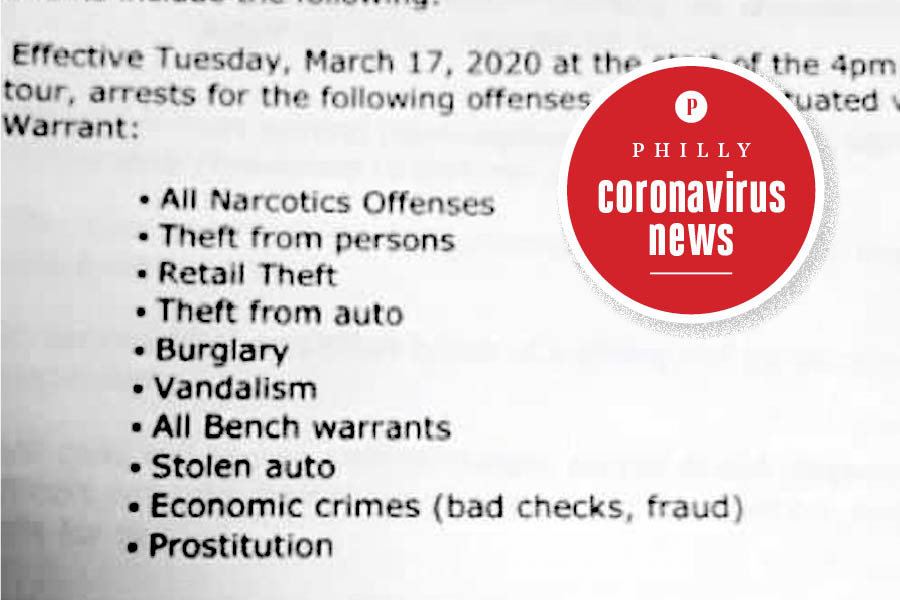Philly Coronavirus News: Confusion Over Arrests, Confusion Over “Essential” Businesses
Our suggestion? Make art.

An image from a notice that the Philadelphia Police Department sent out on Tuesday amid the coronavirus crisis in Philadelphia
A roundup of Philly coronavirus news.
Philly Police Announce Major Change to Arrest Policy During Coronavirus
Late on Tuesday afternoon, the Philadelphia Police Department sent out a press release to local media outlets announcing a big change to the city’s arrest policy.
In short, police said that instead of immediately arresting a person suspected of “certain non-violent offenses,” officers would detain the individual, verify their identity, fill out some paperwork, and then release them. Later, once this coronavirus mess is over, police will make the actual arrest.
What the police department didn’t explain at the time was exactly what offenses we’re talking about here. But these details leaked out via a memo that went to members of the Philadelphia Police Department on Tuesday.
Here are the offenses covered by this new policy:
- All narcotics offenses
- Theft from persons
- Retail theft
- Theft from auto
- Burglary
- Vandalism
- Stolen auto
- Economic crimes (bad checks, fraud)
- Prostitution
So why on earth would the police department change its arrest policy in this way during the Philadelphia coronavirus crisis?
After a firestorm erupted on social media once the message got twisted into something along the lines of “Philadelphia police will no longer arrest criminals,” new Philadelphia Police Commissioner Danielle Outlaw (glad you took this job yet?) took to Twitter after midnight to clarify the policy and offer some explanation.
This is what she wrote:
To be clear, the Philadelphia Police Department is not turning a blind eye to crime. Persons who commit certain non-violent offenses will be arrested at the scene. Once their identity has been confirmed, they will be released and processed via arrest warrant. This is similar to the “summons process” that is utilized in many other counties throughout the Commonwealth. An officer still has the authority to utilize discretion, and take an offender into physical custody for immediate processing, if the officer and supervisor believe the individual poses a threat to public safety.
In order to balance this approach, personnel from several plain-clothes units have been assigned to patrol duties to increase police presence and deter crime twenty-four hours a day.
This temporary response model was implemented to protect our officers, and the communities we serve, from becoming infected or spreading Covid-19. Additionally, these protocols allow us to adjust to the changing availability of resources within other areas of the criminal justice system. To reiterate, criminal offenders will be held accountable for the crimes they commit.
We’ll keep you posted as the situation continues to evolve.
So What Exactly Is an “Essential” Business During Coronavirus?
When Governor Wolf asked (and then told) non-essential businesses to shut down, he was pretty vague about what makes a business essential. But then when Philly decided to come out with its own shutdown order for non-essential businesses, officials provided a bunch of details and specifics, as we detailed yesterday.
In its own way, this level of specificity led to a state of more confusion, and the city was bombarded (and is probably still being bombarded) with requests from local businesses to clarify.
On Tuesday, the city released an updated list of examples of businesses deemed essential, and bike shops made the cut:
- Supermarkets, grocery stores, farmers’ markets, convenience stores, and mini markets
- Restaurants and food vendors providing food through online, delivery, pickup or walk-in
- Pharmacies
- Hardware stores and stores supplying construction materials
- Gas stations, auto repair shops, and bicycle stores
- Banks
- Post Offices
- Stores selling general merchandise and household consumer products
- Laundromats and dry cleaners
- Veterinary clinics and pet stores
- Hotels
- Home/Commercial building repairs
The city also provided a list of “essential infrastructure and industrial businesses” that are allowed to remain open:
- Construction services
- Utilities
- Transportation services (including Uber and Lyft)
- Delivery services
- Waste collection
- Manufacturing
- Security services
- News media
Still, questions persist.
Prior to the city’s clarification, prominent developer, realtor and former City Council candidate Ori Feibush stated the following in a Facebook post: “My office is open and will remain so. The list of businesses provided by the city makes little sense.”
After the city updated its list, we reached out to Feibush to see if he had changed his position.
“We will not be closing,” he replied. “If a beer or electronics store is an essential business, so is housing.”
Need a Distraction? Make Art
We’ve loved seeing local performers like South Philly musician Johnny Showcase, drag queen Eric Jaffe, local industry veteran Kenn Kweeder, and many others doing live performances on social media over the last several days. Keep them coming!
If you’re not gifted with musical talents, that’s OK. We have the solution for you.
Just join the Facebook group One Philly: Coronavirus Public Art Project.
“Let’s stay a united Philadelphia as we practice social distancing,” wrote the admin in a statement. “All Philadelphians are invited to create art based on a shared theme each week and display it in your windows. Themes will be very general and open-ended so that they remain accessible to all age groups and to allow us to be as creative as we want.”
This week’s theme? Plants. Go here to see all the art Philadelphians are creating and sticking in their windows.


